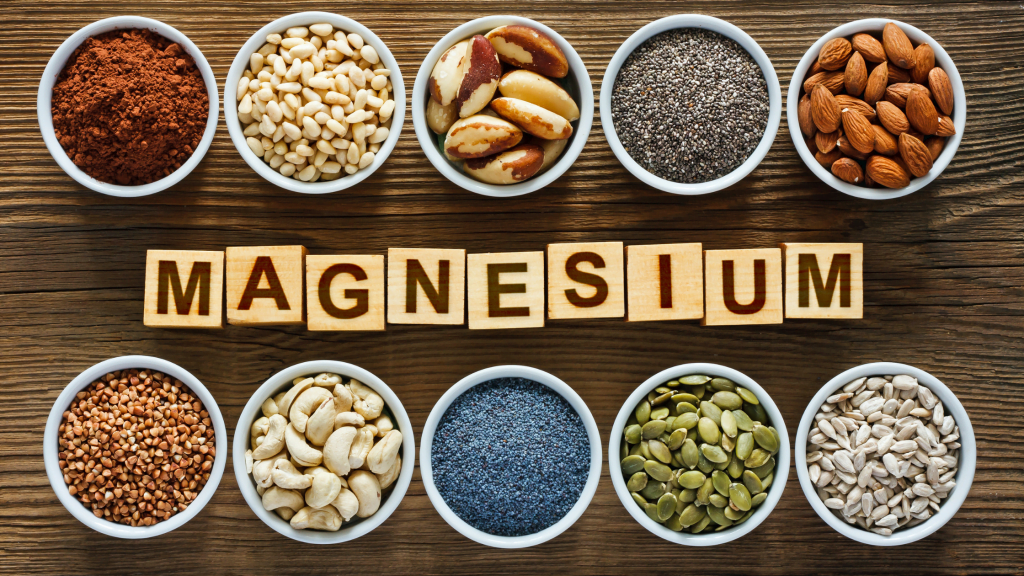Magnesium is an essential mineral that plays a crucial role in numerous bodily functions. It is involved in over 300 biochemical reactions, including energy production, muscle and nerve function, blood sugar regulation, and bone health. Despite its importance, many people do not get enough magnesium in their diets, leading to potential deficiencies that can negatively impact overall health.
In this article, we will explore the key health benefits of magnesium, its dietary sources, signs of deficiency, and recommended daily intake.
1. Supports Heart Health
Magnesium is vital for maintaining a healthy cardiovascular system. It helps:
- Regulate blood pressure by relaxing blood vessels.
- Maintain a steady heartbeat, preventing arrhythmias.
- Reduce the risk of heart disease and stroke by improving blood flow and reducing inflammation.
Studies show that magnesium deficiency is linked to an increased risk of hypertension and cardiovascular diseases.
2. Strengthens Bones and Teeth
While calcium often gets the spotlight for bone health, magnesium is equally important because:
- It helps convert vitamin D into its active form, which is necessary for calcium absorption.
- It stimulates the hormone calcitonin, which helps preserve bone structure.
- Low magnesium levels are associated with osteoporosis and increased fracture risk.
3. Improves Muscle Function and Reduces Cramps
Magnesium plays a key role in muscle contraction and relaxation. Benefits include:
- Reducing muscle cramps, spasms, and restless leg syndrome.
- Enhancing exercise performance by decreasing lactate buildup and fatigue.
- Preventing muscle soreness post-workout.
Athletes and active individuals often require higher magnesium intake to support muscle recovery.
4. Enhances Mental Health and Reduces Stress
Magnesium has a calming effect on the nervous system and is often called the “natural relaxant.” It helps:
- Reduce anxiety and depression by regulating neurotransmitters like serotonin.
- Improve sleep quality by activating the parasympathetic nervous system.
- Lower cortisol levels, the primary stress hormone.
Research suggests that magnesium supplementation may help manage symptoms of PMS, migraines, and chronic stress.
5. Regulates Blood Sugar and Supports Diabetes Management
Magnesium is crucial for insulin sensitivity and glucose metabolism. Benefits include:
- Lowering the risk of type 2 diabetes by improving insulin function.
- Reducing blood sugar levels in people with diabetes.
- Preventing complications related to insulin resistance.
Studies show that low magnesium levels are common in diabetics, making supplementation beneficial.
6. Aids Digestion and Relieves Constipation
Magnesium helps relax the digestive tract muscles, which:
- Promotes regular bowel movements (especially magnesium citrate).
- Relieves constipation by drawing water into the intestines.
- Supports gut health by reducing inflammation.
7. Reduces Inflammation and Supports Immunity
Chronic inflammation is linked to many diseases, but magnesium helps by:
- Lowering inflammatory markers like CRP (C-reactive protein).
- Boosting immune function by supporting white blood cell activity.
- Reducing oxidative stress, which contributes to aging and disease.
8. Supports Brain Function and May Prevent Migraines
Magnesium is essential for cognitive health and may:
- Improve memory and learning.
- Reduce the frequency and severity of migraines by relaxing blood vessels and regulating neurotransmitters.
- Protect against neurodegenerative diseases like Alzheimer’s.
Signs of Magnesium Deficiency
Common symptoms include:
- Muscle cramps and spasms
- Fatigue and weakness
- Irregular heartbeat
- Anxiety and irritability
- Insomnia
- High blood pressure
- Headaches and migraines
Those at higher risk include older adults, diabetics, alcoholics, and people with digestive disorders (like Crohn’s disease).
Best Dietary Sources of Magnesium
To boost magnesium intake naturally, consume:
✅ Leafy greens (spinach, kale)
✅ Nuts & seeds (almonds, cashews, pumpkin seeds)
✅ Legumes (black beans, chickpeas)
✅ Whole grains (quinoa, brown rice, oats)
✅ Dark chocolate (70% cocoa or higher)
✅ Avocados, bananas, and fatty fish
Recommended Daily Intake
- Men: 400–420 mg/day
- Women: 310–320 mg/day (higher during pregnancy)
Supplements (like magnesium citrate, glycinate, or oxide) can help if dietary intake is insufficient.
Final Thoughts
Magnesium is a powerhouse mineral that supports nearly every system in the body. From heart health and strong bones to stress relief and better sleep, ensuring adequate magnesium intake can significantly enhance overall well-being.
If you experience symptoms of deficiency, consider adjusting your diet or consulting a healthcare provider about supplementation. By prioritizing magnesium, you can take a proactive step toward long-term health and vitality.
Would you like recommendations on the best magnesium supplements for specific needs? Let me know in the comments!
References:
- National Institutes of Health (NIH)
- Journal of the American College of Nutrition
- Harvard School of Public Health



